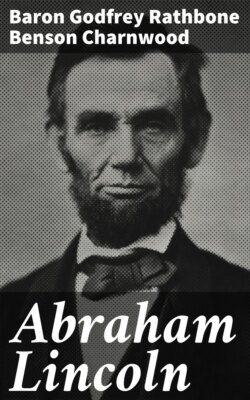Abraham Lincoln

Реклама. ООО «ЛитРес», ИНН: 7719571260.
Оглавление
Baron Godfrey Rathbone Benson Charnwood. Abraham Lincoln
Abraham Lincoln
Table of Contents
GENERAL EDITOR'S PREFACE. CHAP. I. BOYHOOD OF LINCOLN
VII. THE CONDITIONS OF THE WAR
X. EMANCIPATION
XII. THE END. BIBLIOGRAPHICAL NOTE. CHRONOLOGICAL TABLE. INDEX. ABRAHAM LINCOLN
CHAPTER I. BOYHOOD OF LINCOLN
CHAPTER II
THE GROWTH OF THE AMERICAN NATION
CHAPTER III
LINCOLN'S EARLY CAREER
CHAPTER IV
LINCOLN IN CONGRESS AND IN RETIREMENT
CHAPTER V
THE RISE OF LINCOLN
"A. LINCOLN."
CHAPTER VI
SECESSION
CHAPTER VII
THE CONDITIONS OF THE WAR
CHAPTER VIII
THE OPENING OF THE WAR AND LINCOLN'S ADMINISTRATION
CHAPTER IX
THE DISASTERS OF THE NORTH
CHAPTER X
EMANCIPATION
CHAPTER XI
THE APPROACH OF VICTORY
CHAPTER XII
THE END
"A. LINCOLN."
APPENDIX
BIBLIOGRAPHICAL NOTE
CHRONOLOGICAL TABLE
INDEX
MAY WE HELP?
LINCOLN'S OWN STORIES
VI. THE COMMANDER-IN-CHIEF
LEE'S OPINION UPON THE LATE WAR
"3 BOLTON GARDENS, SOUTH KENSINGTON,
"GENERAL ROBERT E. LEE."
"MR. HERBERT C. SAUNDERS,
"R. E. LEE."
Отрывок из книги
Baron Godfrey Rathbone Benson Charnwood
Published by Good Press, 2019
.....
One last recollection of Lincoln's boyhood has appealed, beyond any other, to some of his friends as prophetic of things to come. Mention has already been made of his two long trips down the Mississippi. With the novel responsibilities which they threw on him, and the novel sights and company which he met all the way to the strange, distant city of New Orleans, they must have been great experiences. Only two incidents of them are recorded. In the first voyage he and his mates had been disturbed at night by a band of negro marauders and had had a sharp fight in repelling them, but in the second voyage he met with the negro in a way that to him was more memorable. He and the young fellows with him saw, among the sights of New Orleans, negroes chained, maltreated, whipped and scourged; they came in their rambles upon a slave auction where a fine mulatto girl was being pinched and prodded and trotted up and down the room like a horse to show how she moved, that "bidders might satisfy themselves," as the auctioneer said, of the soundness of the article to be sold. John Johnston and John Hanks and Abraham Lincoln saw these sights with the unsophisticated eyes of honest country lads from a free State. In their home circle it seems that slavery was always spoken of with horror. One of them had a tenacious memory and a tenacious will. "Lincoln saw it," John Hanks said long after, and other men's recollections of Lincoln's talk confirmed him—"Lincoln saw it; his heart bled; said nothing much, was silent. I can say, knowing it, that it was on this trip that he formed his opinion of slavery. It ran its iron into him then and there, May, 1831. I have heard him say so often." Perhaps in other talks old John Hanks dramatised his early remembrances a little; he related how at the slave auction Lincoln said, "By God, boys, let's get away from this. If ever I get a chance to hit that thing, I'll hit it hard."
The youth, who probably did not express his indignation in these prophetic words, was in fact chosen to deal "that thing" a blow from which it seems unlikely to recover as a permitted institution among civilised men, and it is certain that from this early time the thought of slavery never ceased to be hateful to him. Yet it is not in the light of a crusader against this special evil that we are to regard him. When he came back from this voyage to his new home in Illinois he was simply a youth ambitious of an honourable part in the life of the young country of which he was proud. We may regard, and he himself regarded, the liberation of the slaves, which will always be associated with his name, as a part of a larger work, the restoration of his country to its earliest and noblest tradition, which alone gave permanence or worth to its existence as a nation.
.....